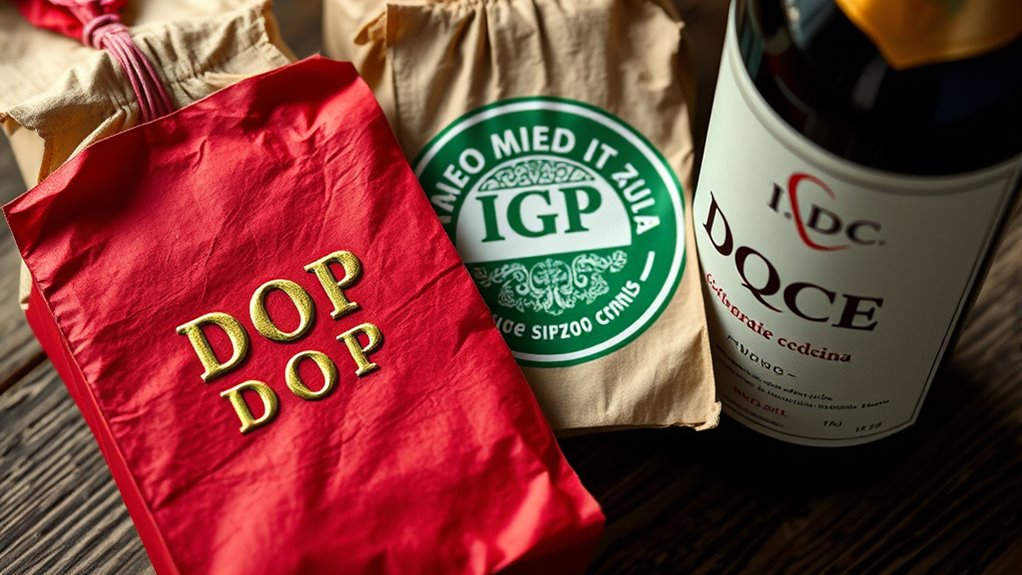Understanding Italian food labels like DOP, IGP, and DOC helps you identify authentic products that reflect Italy’s rich culinary heritage. DOP guarantees traditional methods and regional authenticity, while IGP highlights local origins with flexible standards. DOC ensures quality for Italian wines and spirits. Recognizing these labels empowers you to make informed choices and enjoy genuine flavors. If you keep exploring, you’ll discover how these designations safeguard Italy’s culinary traditions and enhance your experience.
Key Takeaways
- DOP certifies traditional, region-specific products, emphasizing authenticity and cultural heritage, with stricter standards than IGP.
- IGP highlights regional products with flexible production rules, supporting local economies and cultural identity.
- DOC labels guarantee quality and authenticity for Italian wines and spirits, ensuring adherence to traditional methods.
- Food labels like DOP, IGP, and DOC protect regional identities, prevent imitation, and promote sustainable, eco-friendly practices.
- These certifications enhance consumer trust, ensure traceability, and support local producers and culinary diversity.
What Do DOP, IGP, and DOC Stand For?

Have you ever wondered what the labels DOP, IGP, and DOC mean on Italian food products? These labels have rich historical origins rooted in Italy’s tradition of protecting regional specialties. DOP, or Denominazione di Origine Protetta, emphasizes products made in specific areas with traditional methods, ensuring authenticity. IGP, Indicazione Geografica Protetta, highlights products tied to a region but with more flexible production criteria. DOC, Denominazione di Origine Controllata, focuses on quality standards for wines and spirits, reflecting strict regulations. When comparing these labels, DOP and IGP both safeguard regional identity, but DOP is more restrictive. Certification standards often involve geographical indications that promote local economies and cultural heritage. DOC primarily applies to wine classifications, emphasizing quality control. Understanding these distinctions helps you appreciate the heritage and authenticity behind Italian food labels.
The Significance of DOP in Italian Cuisine
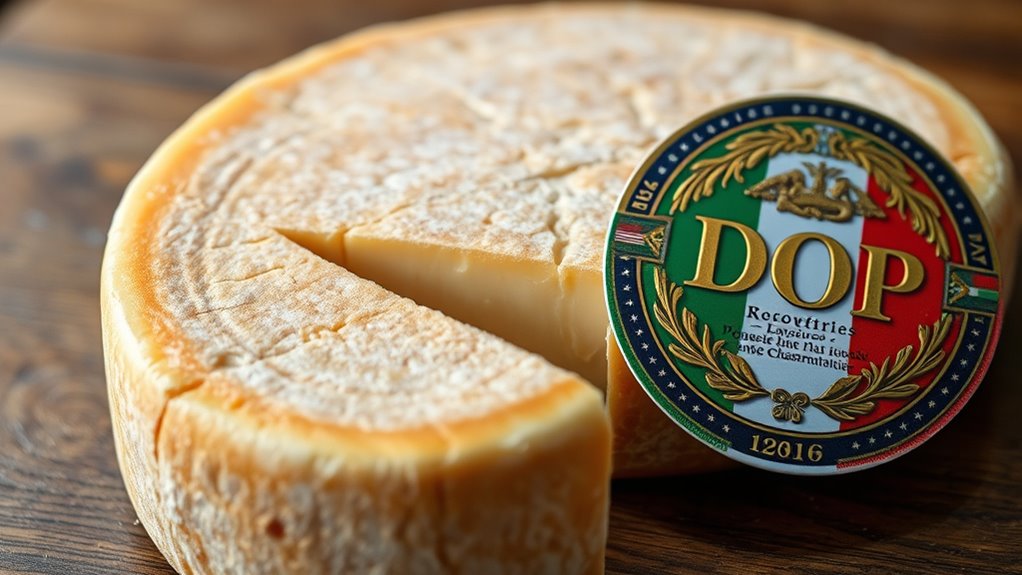
When you see DOP on an Italian product, it guarantees authenticity and safeguards centuries of tradition. This label also guarantees the product meets strict quality standards, maintaining high excellence. Plus, DOP highlights regional specialties, celebrating Italy’s diverse culinary heritage. It also reflects the principles of green chemistry, promoting sustainable and environmentally friendly agricultural practices in production.
Authenticity and Tradition
Ever wondered what truly sets authentic Italian food apart from imitators? It’s the commitment to maintaining traditional recipes rooted in Italy’s rich cultural heritage. DOP, or Denominazione di Origine Protetta, guarantees that these products are made using methods passed down through generations, preserving the true essence of regional flavors. When you choose DOP-certified foods, you’re supporting centuries-old practices that honor Italy’s culinary history. This authenticity isn’t just about taste; it’s a celebration of cultural identity. By adhering to strict regulations, DOP ensures that each product embodies the unique characteristics of its region, keeping Italy’s culinary traditions alive. Certification standards ensure that these products meet rigorous quality and authenticity criteria. When you savor DOP foods, you experience a genuine connection to Italy’s history and craftsmanship. Additionally, regional authenticity plays a crucial role in maintaining the integrity of these traditional foods, reinforcing their cultural significance. Emphasizing traditional methods helps preserve the unique techniques that define regional flavors and distinguish authentic products from mass-produced alternatives. Furthermore, understanding authenticity verification can deepen appreciation for Italy’s culinary heritage, which is supported by strict regulations that uphold high standards across the industry.
Quality Assurance Standards
The integrity of authentic Italian foods relies heavily on strict quality assurance standards that guarantee their genuine origins and production methods. DOP, or Denominazione di Origine Protetta, ensures products are made according to traditional methods, from farm to table. This certification promotes sustainable practices, protecting the environment and local communities. By adhering to rigorous standards, DOP guarantees that each product reflects its regional heritage, maintaining unique flavors and quality. It also encourages producers to follow eco-friendly, sustainable practices that preserve natural resources. As a consumer, choosing DOP foods means supporting authentic Italian cuisine, where quality and tradition are prioritized through transparent, regulated production processes. Understanding cultural significance can be valuable for appreciating how these standards uphold Italy’s rich culinary traditions and influence global markets. Moreover, industry regulations help maintain consistent quality, fostering consumer trust and loyalty. These standards also foster sustainable practices, which are essential for the long-term preservation of Italy’s culinary heritage. The emphasis on aura in quality assurance highlights the importance of visible markers of authenticity and integrity, much like the clear signals provided by certifications such as DOP.
Regional Specialty Recognition
DOP certification plays a crucial role in recognizing and preserving Italy’s regional culinary identities. It safeguards the cultural heritage and highlights Italy’s rich culinary diversity. When you see DOP on a product, you know it’s made with traditional methods specific to that region, guaranteeing authenticity. This recognition helps protect local recipes from imitation and maintains their unique character. This certification also encourages local producers to uphold high standards and authentic techniques, ensuring the legacy continues for future generations. Additionally, DOP status promotes regional culinary traditions, fostering pride and economic development within local communities. Here’s a quick look at some iconic DOP products:
| Product | Region | Significance |
|---|---|---|
| Parmigiano-Reggiano | Emilia-Romagna | Cheese reflecting local tradition |
| Prosciutto di Parma | Emilia-Romagna | Cured ham with cultural roots |
| Olive Oil | Tuscany | Quality and regional flavor |
| Moscato d’Asti | Piedmont | Celebrated local wine |
| Limoncello | Amalfi Coast | Iconic regional liqueur |
This recognition guarantees Italy’s culinary diversity endures through generations.
Understanding IGP and Its Role in Food Authenticity
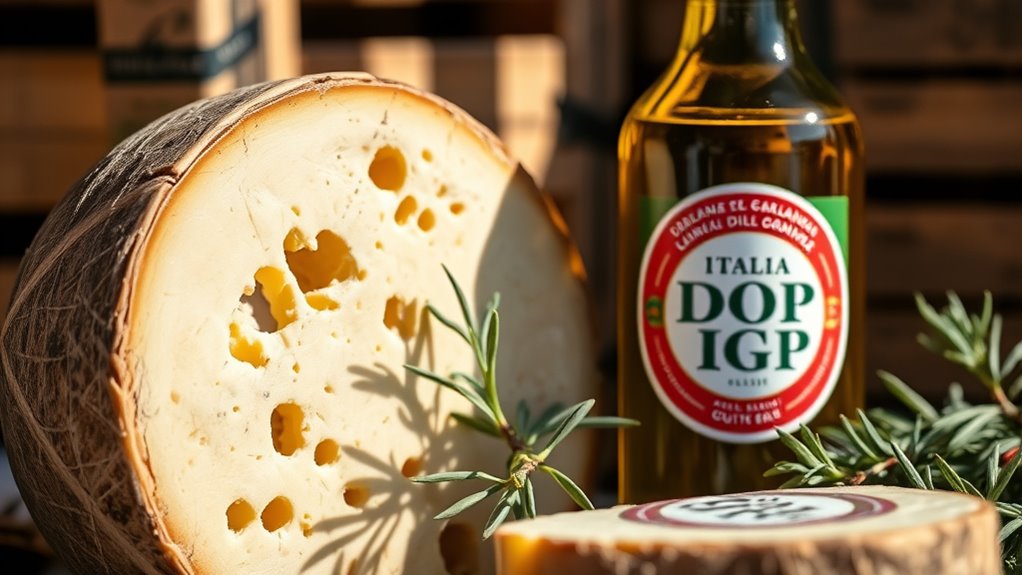
Have you ever wondered how Italian food products maintain their authenticity across markets? IGP, or Indicazione Geografica Protetta, helps guarantee that products reflect their regional roots through strict standards. This label emphasizes authentic agricultural practices that respect traditional methods and protect cultural heritage. Unlike DOP, IGP requires that only one key step, such as a specific ingredient or process, occurs in the designated area, allowing some flexibility. This balance preserves regional identity while accommodating modern techniques. When you see IGP on a product, you can trust it’s linked to its place of origin and adheres to standards that safeguard its unique qualities. In this way, IGP plays a crucial role in maintaining food authenticity and celebrating Italy’s diverse culinary traditions. Additionally, the use of food authenticity standards like IGP helps ensure consumers receive genuine products and supports local economies.
The Importance of DOC for Italian Wines and Spirits
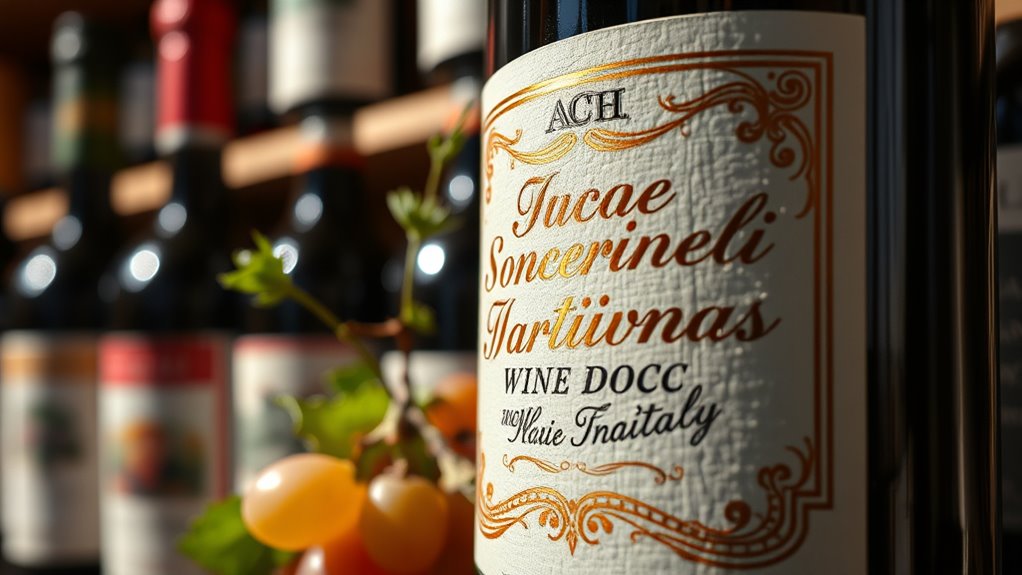
You’re selecting products that meet strict quality and authenticity standards rooted in their regional origins. The DOC label is essential for Italian wines and spirits because it defines a specific wine classification that guarantees authenticity and traditional production methods. When a product bears the DOC mark, you can trust its quality and that it follows strict regulations, preserving the unique characteristics of its region. This label helps you distinguish genuine Italian products from imitations, giving you confidence in your choices. Overall, DOC plays a key role in maintaining Italy’s rich wine and spirit heritage, ensuring you enjoy authentic flavors rooted in centuries of tradition. Additionally, understanding the regulatory framework behind DOC labels can deepen your appreciation of Italy’s commitment to quality and regional authenticity. Recognizing the specific standards required for DOC designation can enhance your knowledge of Italy’s rigorous classification system. The certification process for DOC status involves strict adherence to regional recipes and aging requirements, further safeguarding the product’s authenticity.
How These Labels Impact Your Food Choices
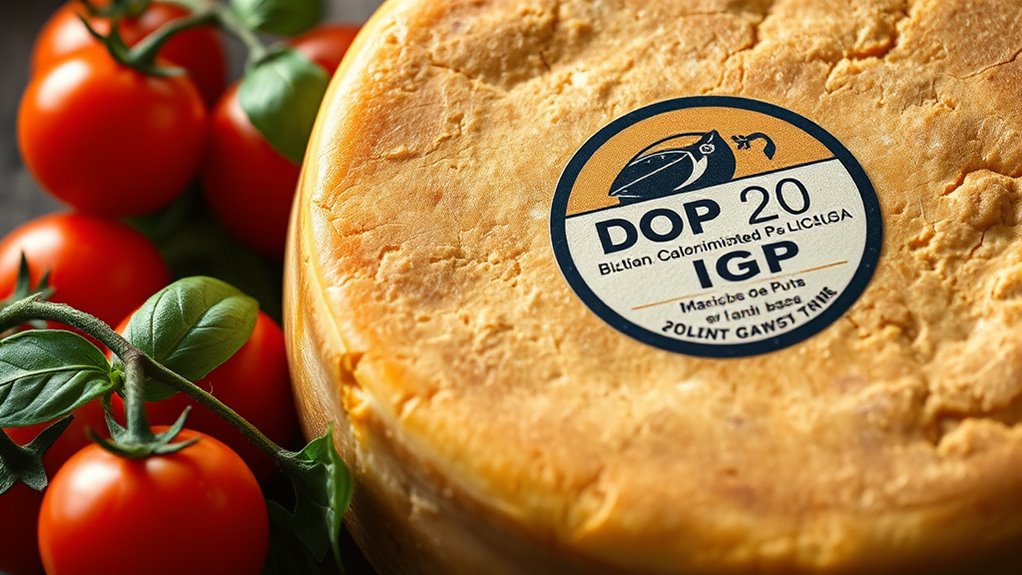
When you look at Italian food labels, you can trust that authenticity and quality are front and center. These labels also highlight regional identity and traceability, helping you make informed choices. As a result, you’re more confident selecting products that meet your standards and support local traditions. Additionally, understanding label certifications can help consumers better recognize genuine products and their unique qualities. Recognizing quality assurance labels can also assure consumers of consistent standards and safety in the products they purchase. Knowing the signs of spoilage in food labels can further assist consumers in selecting fresh and safe products.
Authenticity and Quality Assurance
Ever wonder how Italian food labels guarantee authenticity and quality? These labels protect heritages and foster consumer trust by certifying that products meet strict standards. DOP, IGP, and DOC labels ensure that you’re getting genuine regional specialties, preserving culinary traditions. They prevent imitation and maintain high quality, reinforcing Italy’s rich food heritage. When you see these labels, you’re supporting heritage preservation and making informed choices. Here’s a quick look at what they stand for:
| Label | Focus |
|---|---|
| DOP | Regional authenticity |
| IGP | Local origin and quality |
| DOC | Strict production standards |
| Certifies | Heritage preservation |
| Boosts | Consumer trust |
Regional Identity and Traceability
Italian food labels not only verify quality but also highlight regional identity and traceability, allowing you to make more informed choices. These labels connect you directly to local traditions and sustainable practices, supporting farm-to-table movements that emphasize freshness and transparency. When a product bears a DOP, IGP, or DOC label, it means it’s produced within a specific region, respecting traditional methods and organic certification standards. This traceability reassures you that the food is authentic, ethically sourced, and environmentally friendly. By choosing products with these labels, you support regional farmers and producers committed to maintaining quality and sustainability. Ultimately, understanding these labels helps you prioritize food that’s not only delicious but also rooted in genuine regional identity and responsible production practices.
Recognizing Genuine Italian Products on the Market
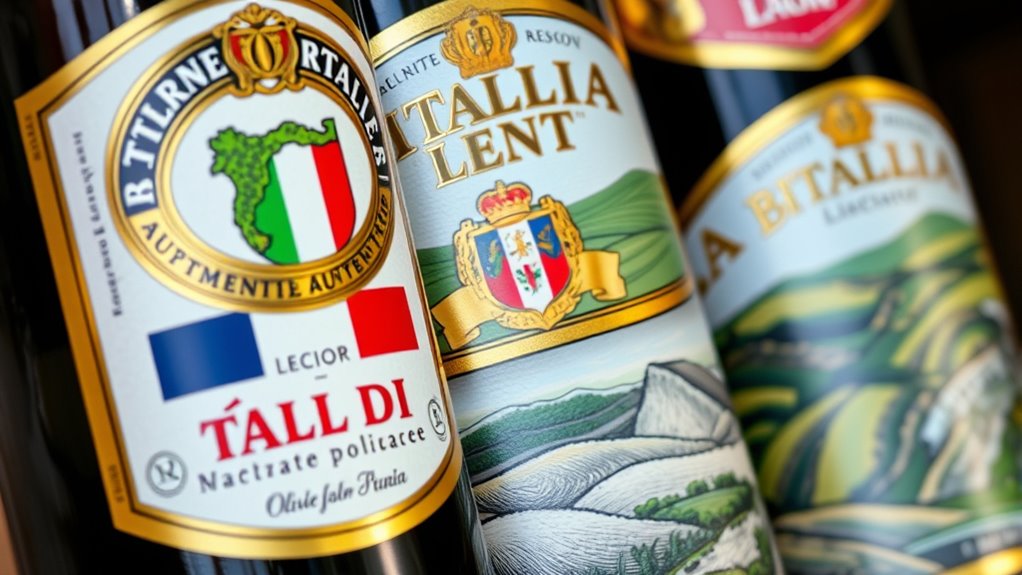
To make certain you’re buying authentic Italian products, it’s essential to pay close attention to labels and certifications. Recognizing genuine items involves understanding their historical origins and being aware of consumer cues. Genuine Italian products often feature official labels like DOP, IGP, or DOC, which guarantee quality and origin. Look for authenticity seals, detailed packaging, and clear origin information. Be cautious of products without proper certification, as they may be imitations. Developing consumer awareness helps you distinguish real from fake, preserving Italy’s culinary heritage. Remember, authentic products celebrate tradition and craftsmanship, so trust labels that highlight their unique regional identity.
| Certification | What it guarantees |
|---|---|
| DOP | Traditional methods, regional origin |
| IGP | Local ingredients, specific area |
| DOC | Quality standards, specific region |
| Authenticity Seal | Genuine Italian origin |
| Packaging Labels | Clear, detailed origin info |
Frequently Asked Questions
Are DOP, IGP, and DOC Labels Legally Protected Internationally?
You might wonder if DOP, IGP, and DOC labels have legal protection internationally. They do, in fact, benefit from legal protection through various international agreements and treaties, like TRIPS, which support the enforcement of intellectual property rights. This international enforcement helps ensure that these labels are recognized and protected beyond Italy, safeguarding the authenticity and quality of products bearing these designations worldwide.
Can Imported Italian Products Carry These Labels Outside Italy?
You might wonder if imported Italian products can carry DOP, IGP, and DOC labels outside Italy. While these labels are legally protected through international trademark enforcement, authenticity verification can be tricky. Manufacturers must meet strict standards, but some products may falsely display these labels abroad. To guarantee label authenticity, you should verify certifications and buy from trusted sources. This helps protect the integrity of authentic Italian food products worldwide.
How Do These Labels Influence the Pricing of Italian Foods?
Sure, because nothing says “worth every penny” like a fancy label, right? These labels substantially influence pricing through branding influence, making foods seem more authentic and desirable. Your perception of quality skyrockets, justifying the higher costs. So, when you see DOP, IGP, or DOC, know it’s not just about taste—it’s about marketing magic that convinces you to splurge. That’s the power of labeling in shaping your shopping choices!
Are There Any Counterfeit Products Falsely Claiming These Certifications?
You should know that counterfeit certifications can be a concern, as some producers falsely claim label authenticity to boost their product’s value. These counterfeit certifications can deceive consumers into thinking they’re buying genuine Italian food with authentic labels like DOP, IGP, or DOC. Always verify the certification through official sources or trusted retailers to guarantee you’re not falling for fake claims and to support authentic Italian producers.
Do These Labels Apply to All Types of Italian Products Equally?
You might wonder if DOP, IGP, and DOC labels apply equally across all Italian products. The answer is no; their certification scope varies by product variety. These labels specifically guarantee quality and authenticity for certain items like cheese, wine, or olive oil. Not every Italian product carries these certifications, so it’s crucial to verify each label carefully. This guarantees you’re buying genuine, protected products with authentic regional origins.
Conclusion
By paying attention to DOP, IGP, and DOC labels, you’re gently guiding yourself toward authentic Italian flavors and stories. These labels aren’t just symbols—they’re whispers of tradition, passion, and history waiting to be discovered in every bite or sip. Embrace the journey of choosing genuine products, and let Italy’s rich culinary soul enrich your experience. In doing so, you’re not just making a purchase—you’re cherishing a timeless legacy meant to be savored.
